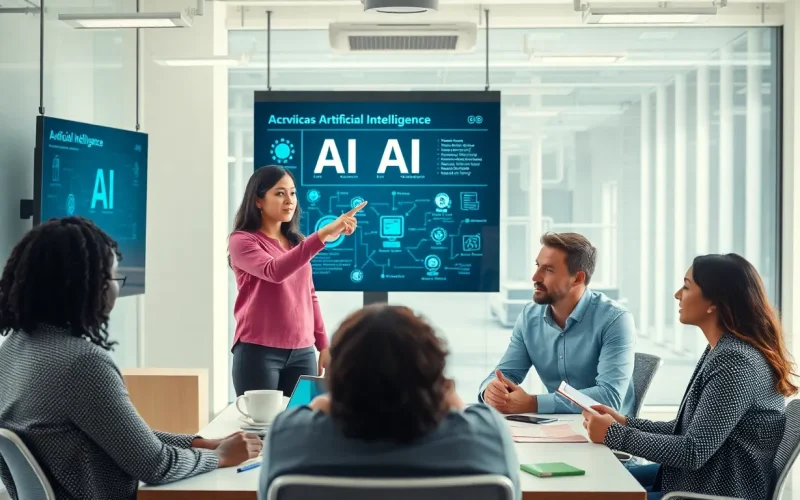Table of Contents
ToggleIn a world where machines are learning faster than most of us can binge-watch a new series, AI knowledge has become the hottest topic since avocado toast. It’s not just for tech geeks anymore; everyone from your neighbor’s cat to your grandma is curious about how artificial intelligence is reshaping our lives. Understanding AI isn’t just a nerdy hobby—it’s a ticket to staying relevant in this rapidly evolving landscape.
Understanding AI Knowledge
Understanding AI knowledge provides essential insights into how artificial intelligence shapes various industries and daily life. It remains crucial to grasp these concepts as technology progresses rapidly.
Definition of AI Knowledge
AI knowledge includes familiarity with the principles, applications, and implications of artificial intelligence. This encompasses concepts like machine learning, natural language processing, and robotics. It’s about knowing how AI systems function and influence decision-making processes. Individuals equipped with such knowledge can interpret AI’s role in various contexts, from healthcare innovations to financial forecasting. An understanding extends beyond technical terms; it involves recognizing the ethical considerations and the societal impact of these technologies.
Importance of AI Knowledge
AI knowledge plays a vital role in staying competitive in today’s workforce. Professionals across diverse fields benefit from understanding AI’s capabilities and limitations. In sectors such as marketing, finance, and healthcare, leveraging AI can enhance productivity and drive better outcomes. Knowledge empowers individuals to adapt to new technologies, ensuring they remain relevant as industries evolve. Organizations prioritizing AI literacy foster innovation and encourage informed decision-making among employees. As AI continues to transform various domains, possessing this knowledge emerges as an invaluable asset for both individuals and businesses.
Types of AI Knowledge


AI knowledge comprises various types that contribute to a comprehensive understanding of artificial intelligence. Distinguishing these forms helps individuals leverage AI effectively across different domains.
Procedural Knowledge
Procedural knowledge refers to knowing how to perform tasks using AI tools and technologies. This style involves understanding the processes underlying machine learning algorithms, data preprocessing techniques, and model training methods. Practitioners with procedural knowledge apply these methodologies to solve specific problems. For instance, data scientists implement various programming languages like Python or R to develop AI models. Familiarity with frameworks such as TensorFlow and PyTorch enhances one’s ability to create and deploy AI applications. This knowledge helps ensure efficient project execution within organizations, driving innovation and improved performance.
Declarative Knowledge
Declarative knowledge encompasses information about AI concepts, terminologies, and theories. Individuals familiar with this knowledge grasp the frameworks and principles behind artificial intelligence. They understand key elements such as neural networks, supervised and unsupervised learning, and natural language processing. With a solid foundation in these areas, professionals can communicate effectively about AI topics. This knowledge base proves essential for making informed decisions regarding AI strategies in various industries. Individuals can improve software development workflows or enhance customer interactions through effective AI integration, resulting in significant business advantages.
Contextual Knowledge
Contextual knowledge involves understanding how AI applies within specific environments and scenarios. Recognizing the industry-specific challenges that AI addresses enables professionals to implement targeted solutions. For example, healthcare professionals leverage AI for diagnostic assistance, while marketers utilize AI analytics for customer behavior insights. Understanding these applications ensures users can adapt AI technologies to their unique contexts. Moreover, contextual knowledge aids in navigating ethical concerns and compliance issues related to AI deployment. This awareness supports stakeholders in making responsible, informed decisions that align with their organizational goals.
Sources of AI Knowledge
Various sources contribute to the understanding of AI knowledge. Academic research, industry applications, and online resources play significant roles in shaping this knowledge.
Academic Research
Academic research serves as a foundational source of AI knowledge. Universities and research institutions conduct studies that explore theoretical frameworks and practical applications of AI. Peer-reviewed journals publish cutting-edge findings, ensuring credibility and depth. Articles examine advancements in machine learning, neural networks, and data ethics. Additionally, conferences foster collaboration among experts, paving the way for innovative breakthroughs. Engaging with academic literature aids individuals in grasping the latest trends in AI technology.
Industry Applications
Industry applications offer real-world insights into AI knowledge. Various sectors, such as healthcare and finance, demonstrate how AI enhances decision-making and operational efficiency. Case studies often highlight successful AI implementations, illustrating practical benefits like cost savings and improved customer experiences. Organizations frequently share best practices with the community, promoting knowledge sharing and innovation. Professionals gain valuable lessons from these applications, which help them navigate the complexities of AI deployment in their own fields.
Online Resources
Online resources provide accessible platforms for learning about AI knowledge. Websites, blogs, and video tutorials cover a wide range of topics, from basic concepts to advanced techniques. Numerous educational platforms offer courses focused on practical AI skills, including machine learning and data analysis. Community forums encourage discussions among learners and experts, fostering a collaborative environment. Utilizing these resources equips individuals with the knowledge needed to stay current in the rapidly evolving AI landscape.
Challenges in AI Knowledge
Understanding AI knowledge presents challenges that must be addressed. Rapid technological advancements and ethical considerations are key factors shaping this landscape.
Rapid Technological Advancements
Technological advancements occur at an unprecedented pace, making it challenging for individuals to keep skills current. Frequent updates in algorithms and tools require continuous learning. Professionals must adapt to new methodologies as they emerge. Updated frameworks in machine learning and natural language processing often outdate existing knowledge. In industries like healthcare and finance, staying informed about these changes poses significant pressure. Organizations face difficulties ensuring all staff possesses up-to-date knowledge. Investing in training programs helps bridge this knowledge gap, empowering workers to leverage AI effectively.
Ethical Considerations
Ethical considerations in AI introduce complexities that impact knowledge acquisition. Responsible AI use encompasses transparency, accountability, and fairness. Concerns arise regarding bias in AI algorithms and potential misuse of data. Professionals must navigate these ethical dilemmas while implementing AI solutions. Regulatory frameworks often lag behind technological developments, creating uncertainty. Employees benefit from understanding the ethical implications of AI in their fields. Prioritizing ethical knowledge equips organizations to address societal challenges effectively. Integrating ethics into AI education fosters a more responsible approach to technology deployment.
The Future of AI Knowledge
AI knowledge is evolving rapidly. Organizations and individuals must stay ahead of emerging trends to remain competitive.
Emerging Trends
Increased automation marks a significant trend in AI knowledge. Many industries adopt AI tools, streamlining operations and enhancing productivity. Natural language processing (NLP) applications grow in scope, enabling more intuitive interactions with technology. Machine learning advancements drive innovations across sectors. Businesses increasingly prioritize upskilling their workforce, recognizing the necessity of AI literacy. Furthermore, collaboration between AI researchers and industry professionals fosters practical, cutting-edge solutions. Ethical AI practices gain traction as organizations strive for transparency and accountability in their systems.
Predictions for AI Knowledge Development
Growth in AI knowledge will likely accelerate in the coming years. Experts predict demand for AI professionals will increase exponentially, necessitating a stronger focus on education methods. Educational institutions may incorporate AI curricula earlier in their programs, ensuring students acquire essential skills. Online learning platforms will continue expanding, providing accessible resources to a wider audience. As ethical considerations gain importance, curricula will likely include modules on responsible AI use. Organizations focusing on continuous learning strategies will foster innovation and prepare employees for future technology advancements.





